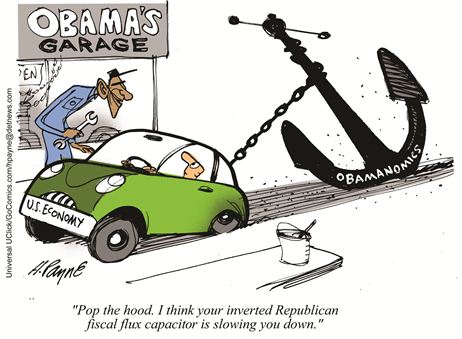Those of you old enough to remember the Cold War may remember something called the Brezhnev Doctrine. This was the rule concocted by the Soviet tyrants that basically said a nation could never regain freedom once it fell under communist rule.
In my simple way of looking at such matters, this rule translated into: “What’s mine is mine, what’s yours is negotiable.”
We have a somewhat similar situation with American fiscal policy. The proponents of bigger government have openly stated that their top goal – both from a policy perspective and political perspective – is higher taxes.
 But what they haven’t told us is that there is no limit on the amount of additional revenue they want to confiscate from people in the productive sector of the economy.
But what they haven’t told us is that there is no limit on the amount of additional revenue they want to confiscate from people in the productive sector of the economy.
In other words, “What’s yours is yours until they decide to grab more.”
So even though President Obama just got his class-warfare tax increase on the so-called rich (as well as a big tax hike on all American workers), is seems all that did is whet his appetite for even more of our money.
Here’s the key excerpt from The Hill.
President Obama insisted Sunday that additional tax revenue will need to be part of future deficit deals… “There is no doubt we need additional revenue…,” he said.
Gee, what a surprise. It appears you don’t cure an alcoholic by giving him more to drink. Likewise, you don’t rein in the spending demands of the political class by giving them more revenue.
Unsurprisingly, the Senate Majority Leader also thinks there should be more money in Washington and less in your pockets. Here are a couple of relevant passages from Politico.
Any budget deal in Congress must “without any question” include revenue, Senate Majority Leader Harry Reid said in an interview aired Sunday. …To lift the sequester, Reid said, the deal needs to include new revenue.
It’s worth noting that Obama and Reid aren’t randomly expressing their addiction to other people’s money. These statements are an explicit signal that they will not allow any changes to fiscal policy unless they get to further fleece the American people.
So what are the practical implications?
- Some lawmakers want to tinker with the sequester because the defense budget is disproportionately impacted. That can’t happen without giving Obama and Reid a tax hike. So the only solution is to go with the sequester.
- Some lawmakers want to reform entitlements to avert America’s long-run fiscal crisis. That can’t happen without giving Obama and Reid a tax hike. So the only solution is to wait for 2017 (particularly since Obama and Reid doubtlessly would insist on the wrong types of entitlement changes that would simply kick the can down the road).
But those are short-term considerations.
The real moral of the story is that we have a serious spending problem in Washington. In theory, higher taxes could be the price to get needed reforms to control the size of government. But in reality, higher taxes are always a substitute for good fiscal policy.
In theory, higher taxes could be the price to get needed reforms to control the size of government. But in reality, higher taxes are always a substitute for good fiscal policy.
So accept the fact that gridlock is the best possible outcome for the next four years and don’t get seduced into a tax hike. Unless, of course, you want to make it easier for the crowd in Washington to increase the burden of government spending.
Read Full Post »

 But what they haven’t told us is that there is no limit on the amount of additional revenue they want to confiscate from people in the productive sector of the economy.
But what they haven’t told us is that there is no limit on the amount of additional revenue they want to confiscate from people in the productive sector of the economy.